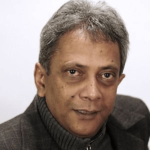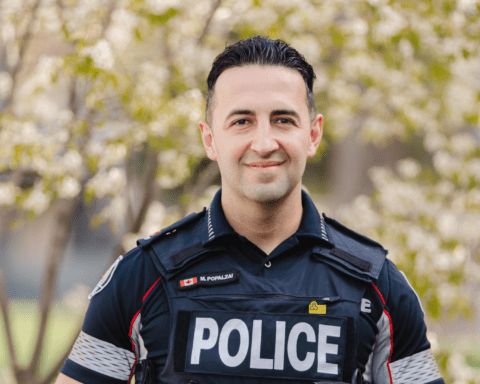More than 6,000 new immigrants have applied to join Canada’s Armed Forces (CAF) over the past two months after the military dropped citizenship requirements to bolster its ranks, according to the latest data provided to New Canadian Media.
“We have seen a huge interest from new Canadians since we’ve opened the door to permanent residents,” Lieutenant-General Jennie Carignan, the military’s Chief of Professional Conduct and Culture told NCM in an interview during her recent visit to Vancouver.
“The number of folks from different backgrounds…new Canadians has increased from 23 per cent to over 30 per cent of applicants,” she said. “This is very, very good news.”
NCM reported on Nov 11 that Canada’s military would be opening its doors wider to attract new immigrants into its ranks after the CAF recruitment site was updated to reflect policy change. Before the change, only Canadian citizens were eligible to apply for employment within the country’s military. Permanent resident status — except in certain categories — did not qualify.
Permanent residents who join the military now will not be subject to the minimum residency requirements — to keep permanent resident status, a new immigrant must be living in Canada for at least 730 days in the last five years — and will be allowed to leave the country for overseas postings or personal reasons.
The CAF is now recruiting for more than 100 positions, including radiologists and marine technicians. As of July 2022, the regular force had approximately 63,500 members — about 8,000 short of its mandated strength. The CAF had a target to bring in at least 5,900 new members through its recruiting centres by March 2023.
Top down, bottom up changes
LGen Carignan, who leads the command team for the military group tasked with leading the Canadian Armed Forces’ cultural transformation, said the recruitment uptick bodes well with her unit’s efforts to modernize the institution.
The mother of four and the first woman in the Canadian Armed Forces to lead a combat unit said her central mission now is to unify and consolidate culture change within the various departments in the CAF and the Department of National Defence (DND).
“This is a whole defence undertaking – bottom up, top down, and horizontally across the CAF,” she said.
“We need to move towards a space where people can be themselves, be authentic and at the same time, contribute to the common mission.
Within LGen Carignan’s organization, there are these five advisory groups that represent visible minorities, Indigenous peoples, the LGBTQA+ community, people with disabilities, and women’s rights advocates.
“We gather their feedback every time we build a new policy… every time we go out and implement various initiatives,” LGen Carignan said. “And they do inform our strategies, our processes and our policies.”
“We are bringing our game up in terms of inclusive behavior,” she said.
The sweeping changes being imposed under LGen Carignan include everything from a new gender inclusive dress code to other aspects of appearance, including the length of one’s hair, and establishing a restorative engagement process, which she expects will guide culture change strategies and resolve personnel conflicts.
There will also be a restructuring of the defence department’s complaints management system and an overhaul to improve the training and promotion of managers.
“I expect a performance measurement framework that will provide quantitative and qualitative data on whether CAF is progressing in terms of creating a healthy culture, to be ready soon,” she said.
LGen Carignan said NATO members are also looking at what the CAF is doing in terms of enabling culture change within its leadership and ranks.
“Recently, I sat down with 25 of our allies within NATO who are very very interested in what we are doing,” she said.
Backlash
LGen Carignan said while most of the military family is very supportive of the required culture changes, she acknowledged that there are some within the military and media who feel otherwise.
Among the critics are Retired Lt.-Gen. Michel Maisonneuve who got a standing ovation from serving senior military officers after a dinner speech last November in Ottawa where he slammed the changes to military dress regulations, reported the Ottawa Citizen.
Thomas Juneau, a former National Defence analyst wrote on Twitter that Maisonneuve’s speech “was an embarrassment and a good illustration of the culture of entitlement that has led to the systematic abuses of power in the senior ranks of the military,” the paper said.
Others like National Post columnist Jamie Sarkonak have suggested that the military’s focus on diversity, equity and inclusion is getting in the way of training for war.
“It’s hard to see why any of this would be relevant to the Armed Forces, which should be focused on defending all Canadians equally,” Sarkonak wrote.
LGen Carignan said building lasting, positive culture change in the military will ensure Canada’s effectiveness in responding to growing threats at home and around the world.
“This has never been a distraction… your teams are not conducive to be the best that they can be if its members do not feel protected and respected when they wear a uniform,” she said.
“What resulted in success in the past will not be what makes us successful in the future. We are at a time where a shift is required in how’ we conduct ourselves, how’ we exercise leadership, and how we understand power and authority,” LGen Carignan responded in an update about her unit.
“We at CPCC are inspired by the changes and evolution we have seen over the past months and are convinced of our capacity to continue to improve together.”
A multiple-award winning journalist, Fabian Dawson is an internationally acclaimed author, filmmaker and media expert. His work over the last four decades spans the globe and he also serves as a consultant/strategic advisor to a variety of international companies. As deputy editor-in-chief of The Province, part of the Postmedia chain, Dawson led initiatives within a special publications group to provide directed content for a variety of organisations. He was named the 2019 recipient of the Bruce Hutchison Lifetime Achievement Award at Jack Webster Awards. Dawson has been invited by the governments of India, Malaysia, Taiwan, China, Hong Kong and the United States to act as a media observer/advisor on a variety of Asian-Canada issues. Dawson, now operates FD Media, which specializes in harnessing editorial assets to revenue generating opportunities.





